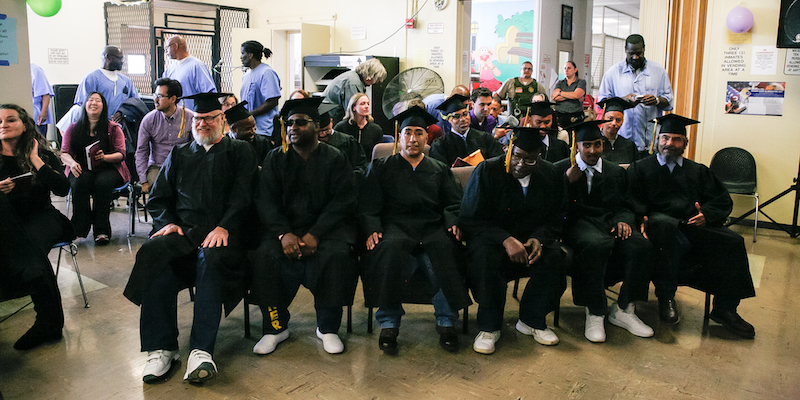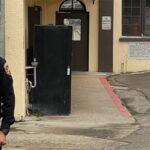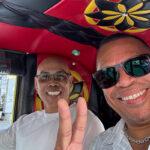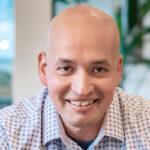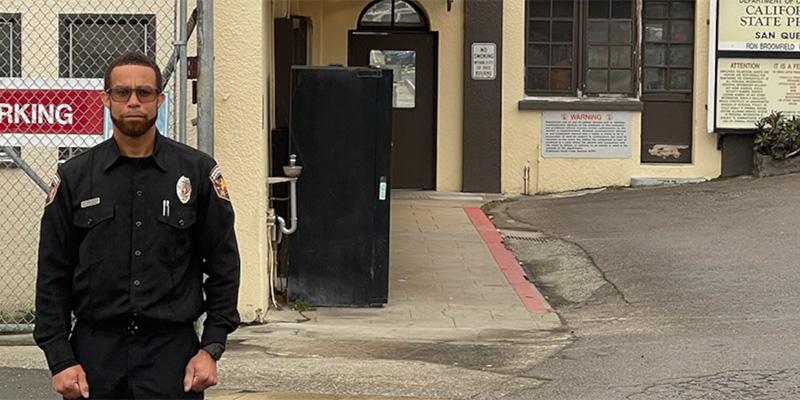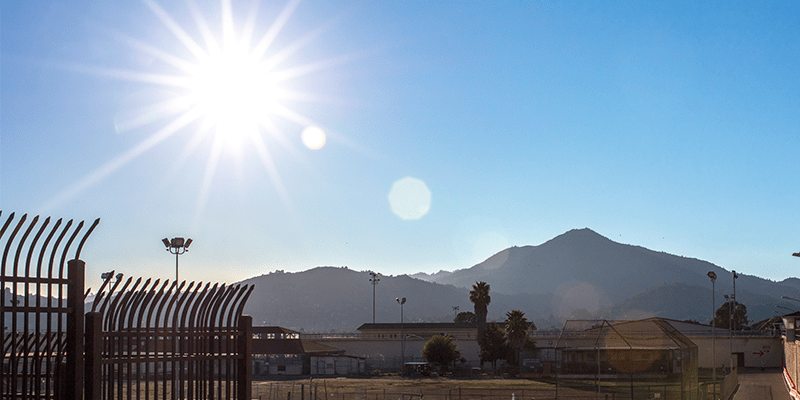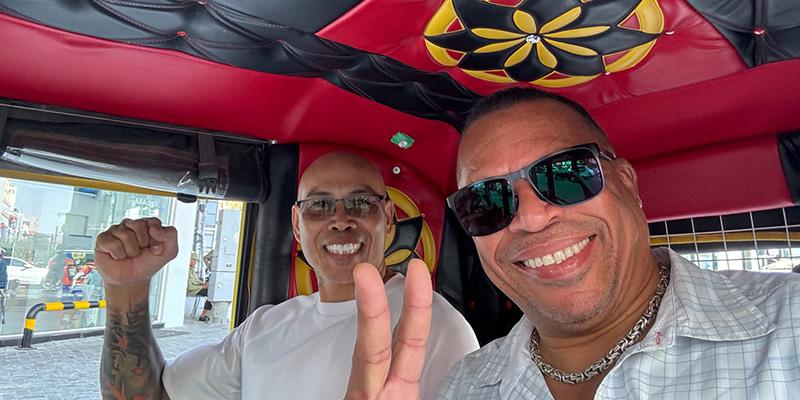Each June we celebrate the achievements of Prison University Project graduates and their successful completion of their Associate of Arts Degrees. This year we honor the hard work, dedication, and commitment of twelve men, who join the ranks of more than 160 fellow graduates over our 20 years in operation.
We interviewed each graduate about his experience in the College Program and what he hoped his legacy for the San Quentin community would be. We’re pleased to share excerpts from these interviews here, alongside beautiful portraits taken by R.J. Lozada.
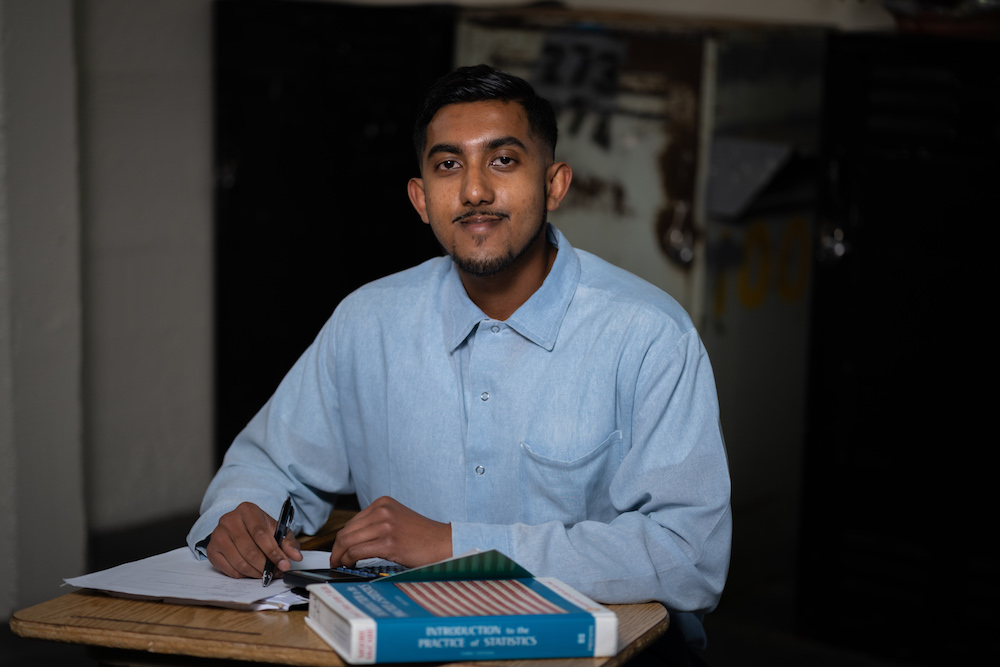
Sumit Lal
Growing up, I was trapped between two worlds. On the one hand, my family always encouraged education and wanted me to go to college. On the other hand, the streets pulled me towards the kind of life that resulted in me coming to prison. When I was younger, I enjoyed learning but the peer pressure from those I believed to be my friends outside caused me to veer away from that path. The College Program brought me back to the kind of person I was always meant to be—the kind I always wanted to be, the kind my family wanted me to be and could be proud of. Today, I can hold intelligent conversations with people I truly respect. I have made the kind of connections that will last a lifetime and which showed me that I can be comfortable among educated people, that I belong with them and not with the negative influences that I allowed to take me away from the learning environment I always loved.
—
The most challenging part about being a college student is leaving behind the people and situations that I had become comfortable with. I was into a negative lifestyle that brought negative behaviors and kept me around negative people. I literally had to shed the person I had become in order to move through the whole college environment. It was not an easy thing to do. I had to end conversations that were not helpful to my succeeding. I had to re-evaluate relationships that would endanger my educational pursuits. I had to become the “nerd” that I had always joked about. I had to evolve and everyone who was not on this path I found myself on had to get left behind. Although I tried to bring as many people with me as were willing to change in order to succeed, I had to do what was best for me.
Being a college student made me change—not only my associations, but other changes as well. I had to keep a schedule, show up on time to classes, and begin a process that changed my language and my outlook.
—
I’m passionate about helping people reach their potential. That’s why I volunteer as a Teacher’s Assistant. I want to show people that they are more than they think they are. I realize that some have gone their whole lives being told a story about themselves that they came to believe and took on as an identity, regardless of whether or not it was true. My journey through the College Program forced me to look at myself and ask the question, “Am I more than this?” I want others out there to know that they are more than even they know. I want them to find their dreams and then give them the tools to realize them, even if all I can do is point them in the right direction.
Because I know what it’s like to be a young man in prison, I’ve tried to work with young people to show them another way. I’m the biggest recruiter for the College Program. I make sure that the young people coming into San Quentin know that they don’t have to do what everybody else does, they can choose another, more positive way that will have better results in their lives when they hit the streets.
—
I attribute my success to all the instructors and tutors who did not accept me as the student I entered the class as, rather they treated me as the student they knew I could become. These instructors—including Dr. Fisher in Philosophy, Laura and Paco in English 204, Aris, Will and James in Communications—all knew I could do better than how I showed up. These instructors actually cared that I learn the material rather than just pass the class. For that I am grateful. Last but not least, the whole San Quentin community and the struggles from my past have helped me succeed today.
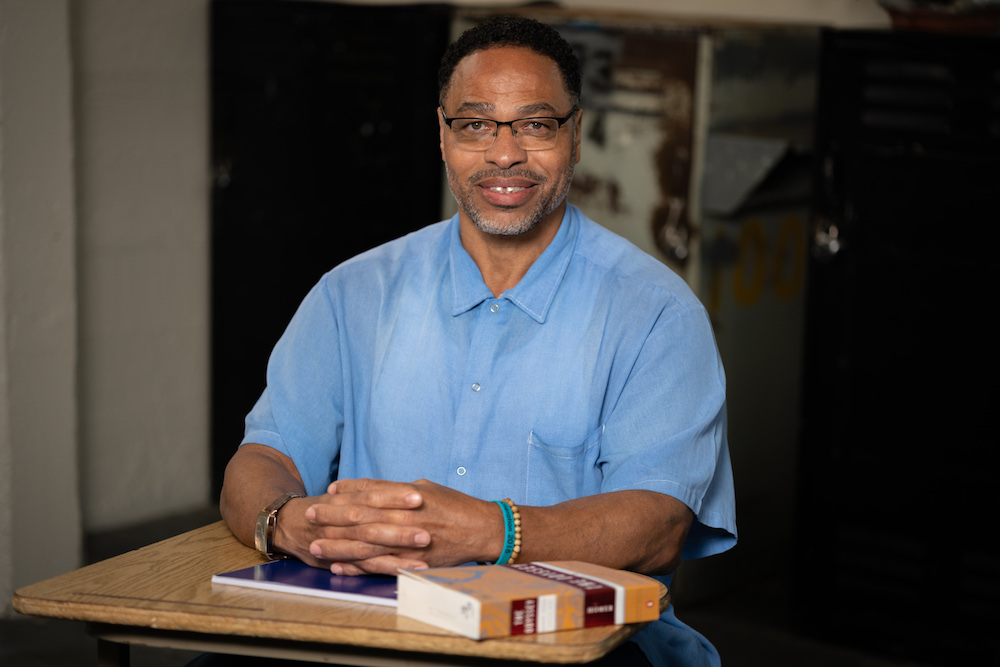
Tommy “Shakur” Ross
Aside from the academic attainment, the College Program has had a huge impact on my life, identity, and my relationships. Since my arrival to San Quentin in 2012, and my acceptance into the College Program, my life has changed substantially for the better. I’ve become an A student, a radio/video journalist, peer health educator, group facilitator, circle process keeper, event planner/organizer, and restorative justice practitioner; but more importantly, I now accept full responsibility and am accountable for the crimes I committed. I’m no longer lying to friends and family denying, justifying, or blaming others for what I have done. Now that I have insight into my traumatic childhood, subsequent criminality, and how my negative actions harmed others, I know that I will never live that way again. It’s not only because I understand the contributing factors that led to my criminal thinking and bad decisions; or the remorse and regret I feel for hurting others; moreover, I realize that I am a kindhearted, loving and giving, good person. Consequently, I’m no longer doing time, I’m serving it.
—
In the fall of 2014, during the English 204 course, I wrote a research paper entitled, “Sexuality and Empowerment: A Feminist Perspective.” I am most proud of this work because it altered my worldview about women, igniting the initial spark that led to my identity as a feminist. During my research, I learned about the various waves, branches, and strands of feminism that have evolved throughout the course of history. For instance, first wave feminists challenged stereotypes and social constructions of women, which dictated that a woman’s place was in the home. These feminists rejected the notion of women as the second sex and therefore deficient. They confronted systems of sexism and patriarchy, thereby paving the way for second wave feminism. I learned that there were branches of second wave feminism which had opposing ideas about how to achieve sexual liberation and gender equality for women. To add to the contentious debate within the feminist movement regarding the relationship between feminism and sexuality, the third wave of feminism boldly asserted that feminism isn’t about what choice you make, but the freedom to make that choice. Thus, third wave feminists had conflicting views with older feminists, naming them as obstacles to the success of the women’s movement. Based on my research, I discovered that feminism is a spectrum, not a box for women to be locked in.
—
If I could share one piece of advice with incoming students, it would be to develop time management and set priorities for studying and doing homework. However, in order to do this, take your education seriously. For every hour you spend in class learning, spend at least two hours outside of class internalizing what you learned. This can be done in your cell, study hall, or any other space that’s available to you for studying. Develop a daily study routine and stay consistent, allowing no one to sidetrack your main objective. Progress can be measured; if my advice is adhered to, you’ll find yourself coming to class well prepared, ready to engage and actively participate in class discussions, contributing your thoughts, comments and questions about the course materials; but most of all, finding success in your identity as a college student. Stay focused and keep your eyes on the prize!
—
In my early semesters at Patten, I lacked the social skills required in a college/classroom setting. For me, this deficit was the most challenging part of being a college student. I believe it stems from my school experience during my child and adolescent years. I had issues with anger, behavioral problems and low self-esteem resulting from unprocessed trauma. Consequently, I found myself triggered by students and teachers inside the classroom. It seemed like oftentimes I’d raise my hand to speak, but the instructors would call on the more talkative students. It was frustrating to think that I was being ignored and/or forgotten. Naturally, this discouraged me from participating in classroom discussions, or asking for help. However, the more eager I became to learn, the more inquisitive I came to be. I began being more proactive by asserting myself, and raising my hand more often. I’d say things like, “I believe I was next,” or “Excuse me, I have something to say.” As a result, I began feeling more confident, and started sitting in the front of the class. I became motivated to be the best student I could be, and decided I will not deny myself the opportunity to learn as much as I could. The College Program taught me both social and coping skills, impacting not only my academic intelligence, but my emotional intelligence as well.
—
Aside from the dedicated instructors and tutors, there are three people that I want to acknowledge, who have been instrumental in my success as a student: Fania E. Davis, Adrienne S. Roberts; and Joe Garcia. Fania is my cousin. She is a kind, insightful and loving person who has motivated me with her overall support, words of encouragement, and feedback on the writings that I’ve mailed to her over my years as a student. Adrienne is my girlfriend—my ride or die. She has been my inspiration for when I wrote papers on gender identity and feminism. I’d send her final drafts that were marked up and graded by my instructors, and she would add her comments and return the paper to me. Adrienne also challenged my perspective and worldview on the LGBTQ community, which has motivated me to be more inclusive, tolerant and accepting towards people who see themselves differently. Joe Garcia is a fellow incarcerated person, who I relied on daily during both the Elementary and Intermediate Algebra courses. Although he used shameful sarcasm as a method of tutoring, he was very effective because it challenged me to learn my lessons. What I really appreciate about Joe is that he dedicated his time to helping me, no matter how uncommon his common sense was.
—
To my fellow graduates: On our journey towards graduating, I’m sure that I’ve shared the classroom with most of you, if not all of you. We’ve faced a number of challenges, whether it was lockdowns, fog-lines, badgering officers, annoying classmates, or delayed count/late cell releases, etc.; but one thing is for certain: We stayed the course and made it to our destination! We did it! We are Patten University graduates! Let this moment serve as a testament that we can accomplish the things that we put our minds to. Being a student at Patten provided my life with meaning and purpose. Each day that I read, studied, wrote an essay, or prepared for an oral presentation, I could feel myself learning, growing, and becoming a better human being. It’s analogous to a caterpillar in a cocoon, metamorphosing into a butterfly and taking flight! We have come! In the words of Teddy Pendergrass, “Ain’t no stopping us now—we’re on the move!” Congratulations fellow Patten University Alumni!
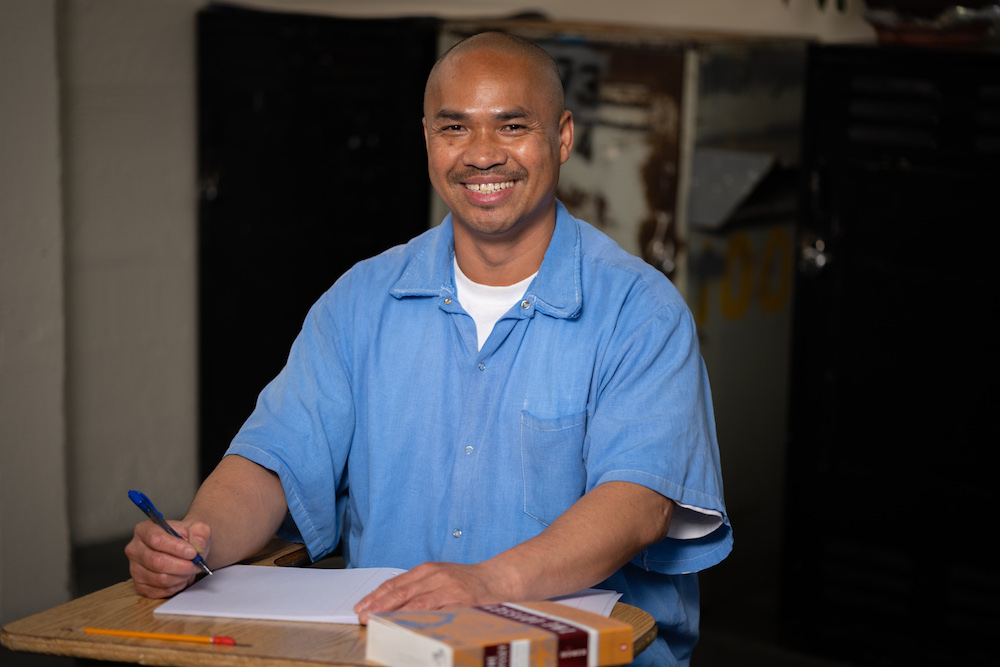
Kamsan Suon
In the beginning, I doubted myself and didn’t know if I had the intelligence to make it through the program—I had never written essays before. Now, I’m a writer and a poet. Writing has become a crucial part of my healing process. Writing helps me identify what went wrong in my life and my childhood, and it allows me to heal by expressing it. My passion for writing personal narrative and nonfiction stories keeps me grounded. I’m able to escape from reality and be anyone and anything. I can go anywhere, anytime. I love writing about my childhood experiences in Cambodia, the early years in Oklahoma City, Oklahoma, and Modesto, California. I would always get excited when the assignment is to tell a story of my past, whether through writing or verbal description. In the future I plan on writing at least one book. I have an imaginative mind and want to put it to good use.
—
I am a refugee and a survivor of the Cambodian genocide in 1975 to 1979. My best piece of writing is a poem titled, “Uncharted Memories (Justice is Rape)”. The poem is about my experience in Cambodia where 1.7 million humans were murdered by the government, the Khmer Rouge. I wrote this poem many times and every time I revised it, I had tears in my eyes. For some reason I’m not ashamed of my tears any more. I know in order to heal I have to cry. Now I let my pain go instead of holding it in.
I performed the poem at Open Mic this past December. I wanted to share my pain with my peers. It was nerve-wracking because I had never been on a stage expressing my feelings. I’m glad I did it. The pain and resentment I held against the Khmer Rouge has been extinguished. I am free!
—
In the beginning, as a college student, I was always worried that the professor would ask me to comment on the assignment and questions. I prayed I would not be asked. Although I am at liberty to not participate in class discussions, I felt I would be disrespecting my instructors and classmates with my rebellious behavior. That worried me so much. I was a very quiet person who believed that my opinion was not significant. Also, I feared I would be judged for my comments. I didn’t want to feel ashamed for my comments because they were often off-topic or weak arguments. But as my education continued, I came to understand that my opinions do matter. Students and professors value each other’s opinions. So I started to comment on the assignments and questions during class discussions; I broke out of my comfort zone and enjoyed being able to share my thoughts without fear of judgment.
—
One piece of advice to new Prison University Project students is: Don’t quit. When you think that things are not going well and the only choice left is to quit, you realize this is the real reason why you wanted to accept this challenge. Don’t doubt yourself and always have a positive attitude. You will grow and be proud of your accomplishments. You will love the feeling when you get a good grade. The benefit is worth the pain. You will become a new person with new ideas on how to live your life. The Prison University Project is investing in you, so don’t give up on your education and goals.

Jerry Smith
I would like my actions as well those of others around me to show the world to not give up on people in prison. My father instilled in me the importance of being independent, but I took it to the extreme. I was stubborn and never allowed myself to accept help. Now I am very open-minded about accepting help, so all relationships nowadays—I know they are in my life for a reason.
—
My favorite school assignment is hard to pick. I have learned something of value from every assignment. If I had to pick, it would be sociology with Ms. Jane Yamashiro. We were asked to write on gender bias amongst other issues. That exercise exposed a bias I wasn’t aware of, so I really was grateful for that. Plus, she has a very unique style of teaching that really helped me in other classes.
—
The College Program made me aware of life beyond my immediate surroundings. Now my aim is to help young people in my community with problems and challenges they have in setting goals. I’m from Los Angeles, from an area that’s gang-infested. I keep in touch with a lot of young people in my family now—I feel super obligated—I want them to learn from my situation. They are the future. I write them and ask them directly to stay in school. I try to provide a vision for the youth in my community to shift their focus from negative thoughts, to make them aware that they have value, and to recognize their strengths.
—
The most common misunderstandings people have about the prison system are the flaws in the criminal justice system pertaining to wrongfully convicted individuals. I wish people understood how an incarcerated person is robbed of their identity.
—
To my fellow classmates, remember that taking that step forward—deciding to go to college—was courageous on our part. As a reward, we have taught our minds to think in a different way. It’s a major accomplishment to achieve this in this environment.
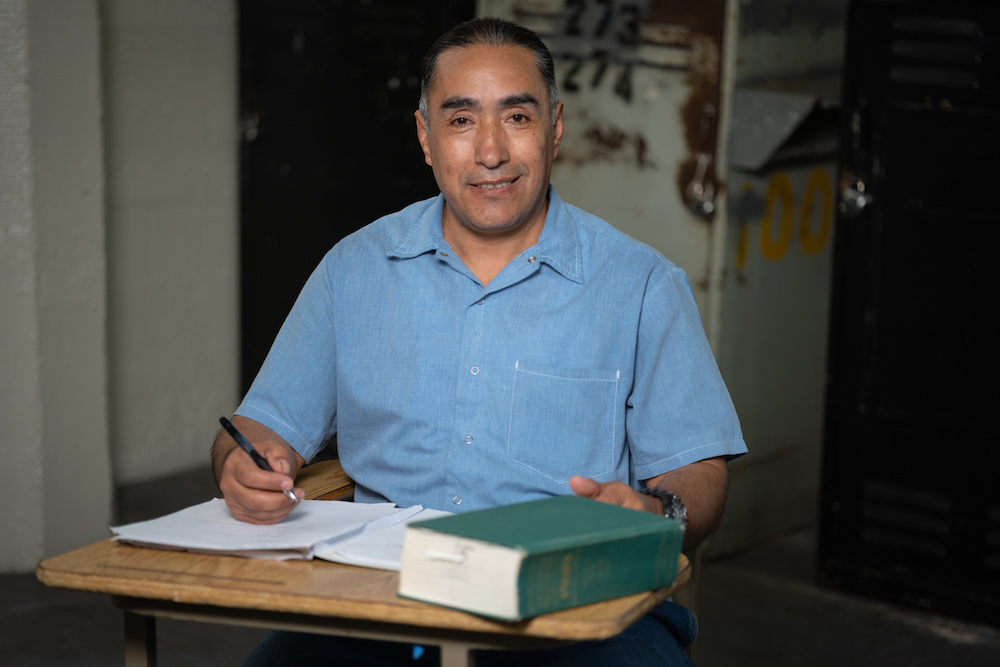
Juan Espinosa
I never thought that I would ever be able to get an A.A. degree, let alone even attend college. I never took my education seriously before because I thought I would never be able to accomplish anything in life. After receiving my A.A. degree I am planning on continuing my education. My next goal will be to get an M.B.A. degree, and if possible continue until I achieve my Ph.D. in molecular engineering.
—
My favorite school assignment was writing my essay and my presentation for biology class. It was a bit challenging but I learned so much about fungi—specifically about why it is so difficult to eradicate. Apart from being resistant and destructive, I learned that it is difficult to get rid of because its cell structure is similar to our body’s cells, therefore any medication we use for nail fungus not only attacks the cell of the fungus but also other cells in our body.
—
The advice I would give to incoming students would be that no matter how hard and difficult the classes or the assignments are—never give up. You will have plenty of help and support with teachers, tutors, teaching assistants, and all the personnel that are part of the Prison University Project. All you have to do is ask—never be afraid to ask.
—
For me the most challenging part of being a college student has been the language barrier. English is my second language and I have had to double up in my efforts to understand some of the lecture concepts given by the professors. There were lots of times when I did not understand something in class. I would not ask the teacher to repeat it because I did not want to look dumb in front of the whole class. Then, when it was time to give my presentation I really had to push myself because my English is not that good and I wanted to make certain that my teachers and peers could understand me.
—
To my fellow graduates—I congratulate all of you for your accomplishments. I would like to commend you for your hard work and dedication you have put forth in an effort to better yourselves in life. This is a tremendous first step in building a better life and future for all of us. I encourage you to commit yourselves in continuing your academic education far beyond what you have accomplished today. Do not be content with an A.A. degree; keep on pushing yourselves until you accomplish all other goals you have set. This is a huge step toward your life accomplishments. Never stop until you reach the pinnacle of success in life and know that you will impact the lives of others in a positive manner through the hard work and dedication you’ve demonstrated.

Matthew Nguyen
The College Program allowed me to better myself intellectually. It enabled me to have better relationships with my family by allowing me to communicate more effectively with them. The program helped me build up more self-esteem and changed my negative identity—one of a convicted felon—to a more dignified one as a college graduate.
—
The piece of work I was most proud of was a research paper. It was the top of Mount Everest to me because I had never written any paper over 1,000 words before and this assignment suggested 4,500 to 5,000 words. This was not an easy assignment and I worked on it practically every day. Once I finally reached the top and finished the paper, I felt more confident and believed that I would be able to actually finish the College Program and get my degree.
—
I would like to name Jody, Amy, Heather, Allison, Neil and Derrius as those especially influential to my experience as a student. They impacted me by showing genuine concern and care about my progress. They helped me when I asked and made me feel welcomed. Seeing the college’s staff working hard and putting serious effort to keep the program running, it inspired me to keep going. I knew that when there was a lockdown, the college’s staff would quickly get my butt into those chairs in class, and that made me feel very thankful and grateful for everything they had done.
—
To my fellow graduates—In one of the worst circumstances to be in, we are able to accomplish this milestone in our lives. Now, imagine what else we can accomplish!
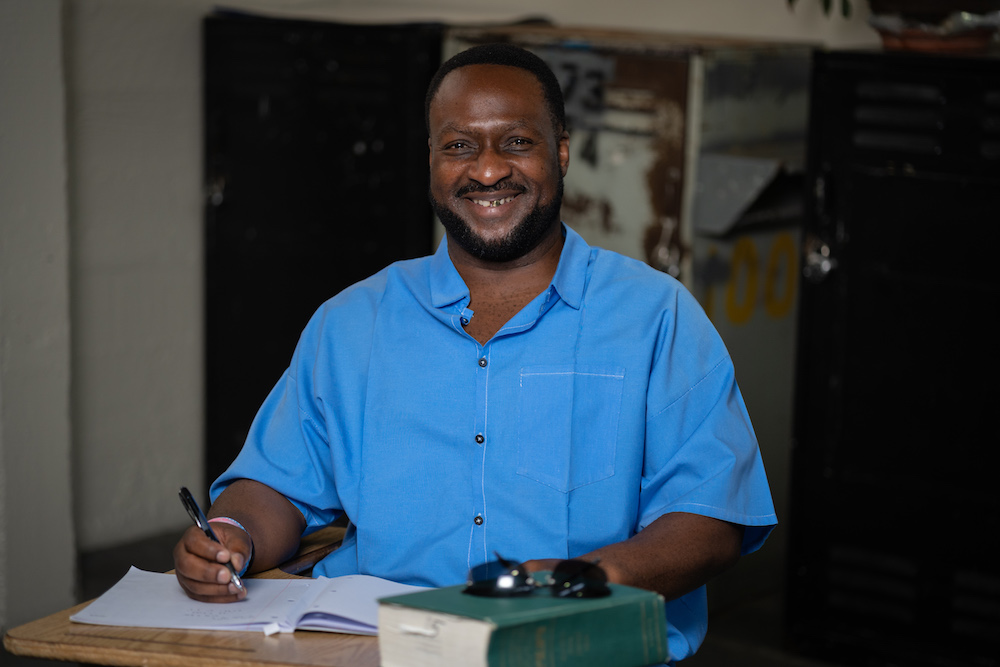
Nythell Collins
College has impacted my life by allowing me to become more informed on a wide range of topics and issues. I was very limited in what I knew previously. Now with the knowledge I’ve gained so far, I’ve come to learn that there’s still more that I don’t know. College has also impacted the way I see myself. I once thought I wasn’t smart enough to take college courses due to my past experience with school. I no longer hold that belief. It’s because of my effort, determination, and will—along with college instructors and staff members who encouraged, challenged, and supported me—that I now consider myself able to do anything academically when I put my mind to it.
I want to leave a legacy of empowerment. I hope that my life inspires men to seek education because knowledge is power, and with more power we can make meaningful changes in our lives and communities. Also, I would hope that my life shows members of outside communities that even though we’ve made bad choices that led us to prison, we are human, we can change, and we value education.
—
What I would share with incoming students would be this: regardless of the difficulties you may face in furthering your education, don’t give up. There’s help available if you ask. Also, having a positive attitude is key to having a successful college experience. A positive attitude makes it a little easier to get through the difficulties that will arise during your time in college. It’s okay to not know and being frustrated is natural. Remember anything worth having should be hard to obtain. Growth is not easy, nor impossible to those who apply themselves. As Winston Churchill said, “Success is not final and failure is not fatal.” To do nothing at all is the tragedy.
—
All my teachers and tutors were very influential in my college experience. However, the most influential teacher I have had was Jane H. Yamashiro, Ph.D., my sociology teacher. Jane made me feel like I belonged in college and that I could go as far as I wanted to. Her belief in my ability as a student really touched me because most of my life no one ever believed in me or saw me as smart. She did and I’ll always be grateful to her for her kindness.
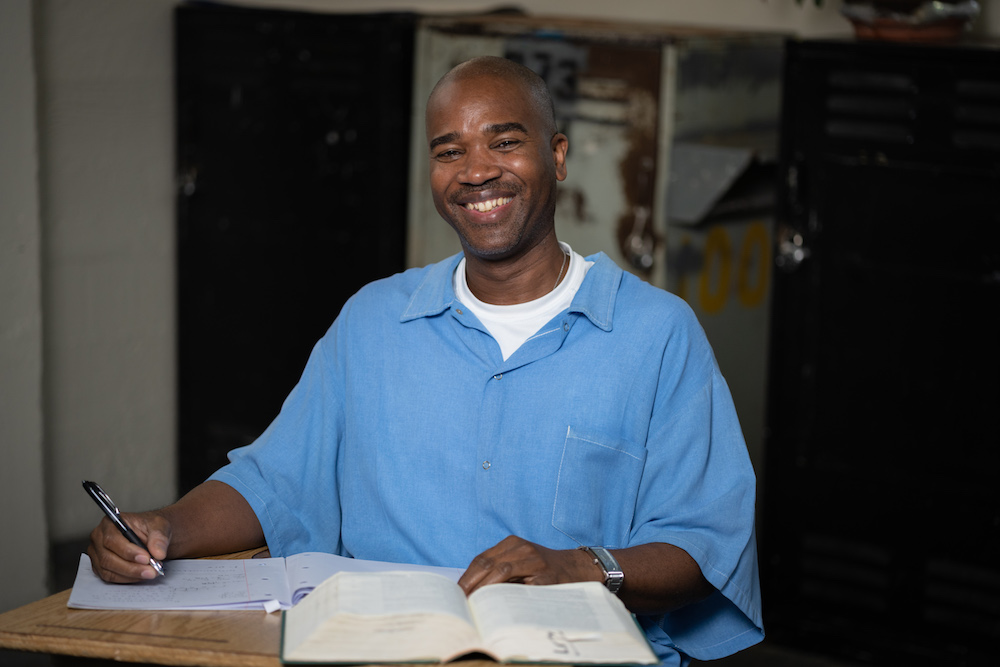
Timothy Young
I never in a million years thought that I would be able to seek higher learning as well as attend college-level classes while incarcerated. This was both exciting and challenging because I never had the opportunity to do so prior to my incarceration. Now, as I prepare to graduate, I hope to leave a legacy for all new students demonstrating that hard work and perseverance is crucial in anything you set out to achieve in life. Maybe the work that I have done and continue to do will inspire others to do the same. I hope someone notices me and thinks, “If he can do it, I can do it.” I would then say to that person, “You can do more.”
—
I would love to talk about the Prison University Project’s Open Mic Night. This program affords all alumni, current students, and staff an opportunity to share a talent—whether it’s a spoken word piece, a short story, poetry, comedy, a dance, music, and more. I think that this event is very important because it creates a positive and creative arena for conversation.
I learned how to play the guitar while studying in the College Program and on December 28, 2018, I presented an instrumental on acoustic guitar entitled, Music From My Soul. It was interesting playing my guitar in front of an audience of 300-plus people. It was amazing and definitely a learning experience. Before I picked up the guitar, I said, “I’m going to share something personal that emerged from my soul. It’s raw, it’s original and it’s me.” Some said I played like a pro. I am thankful for that opportunity and also grateful that those who did attend were able to share a personal experience with me. Thank you to the Prison University Project for additional programs like Open Mic Night.
—
I believe that the study of Liberal Arts allowed me to rise above in a positive way, viewing things through a brand new lens. Prior to my studies, the way I saw myself, others, and the world was drastically impaired. The study of Liberal Arts opened a new door of conscious thought for me and changed how I perceive the world and my life. Studying topics such as social ethics, sociology, philosophy, U.S. history, literature, world religions, public health, algebra, and more—I realize that there was no place that I could not go. I could envision great new possibilities in life. Now I can actually be the man that God created me to be. The study of Liberal Arts changes lives.
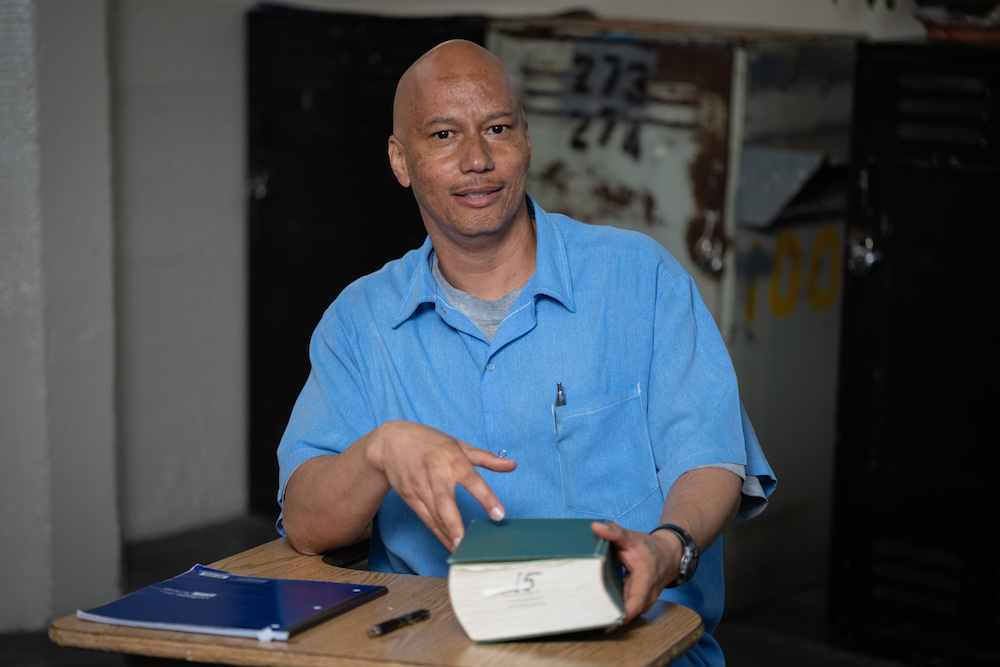
Corey McNeil
I’d like to leave behind a “you-can-do-it” legacy, to be inspirational and show others what is possible. I dropped out of school around the 7th grade and got my GED in prison. After earning my degree, I no longer think of life as if I’m on the outside looking in. It’s put me on equal footing. It allows for better understanding and compassion in all of my interactions with people and in my personal relationships.
—
One of the most interesting classes to me was sociology. Learning how sociologists use various theories to understand and explain society was impactful for me. It was also challenging in that it created a tension. For example, Emile Durkheim’s theory on asylums—where you imagine the world as a stage and everyone on the stage is performing scripts that are naturally there. I believe these “scripts” are being created all the time and people can define themselves and decide how they show up in life. We can bring awareness to our own scripts which allows us to continue to reinvent ourselves. This is what education has afforded me.
Now that I’ve graduated, I’d like to continue my education in some shape or form. I’m happy to say I was accepted to Project Rebound. If all goes well and I’m out in November, I’ll probably start the program in January or in the summer of 2020. I’d like to have some time to get my feet under me before getting started. I’m interested in majoring in public administration or counseling—something interactive, where I’m working on the ground with people in need.
—
This college experience is something that I will never forget. It has taught me the value of going through a journey, with all its ups and downs. That is why I’m inspired by people who push themselves, show up, and are determined, resilient, and focused. I aspire to be that way.
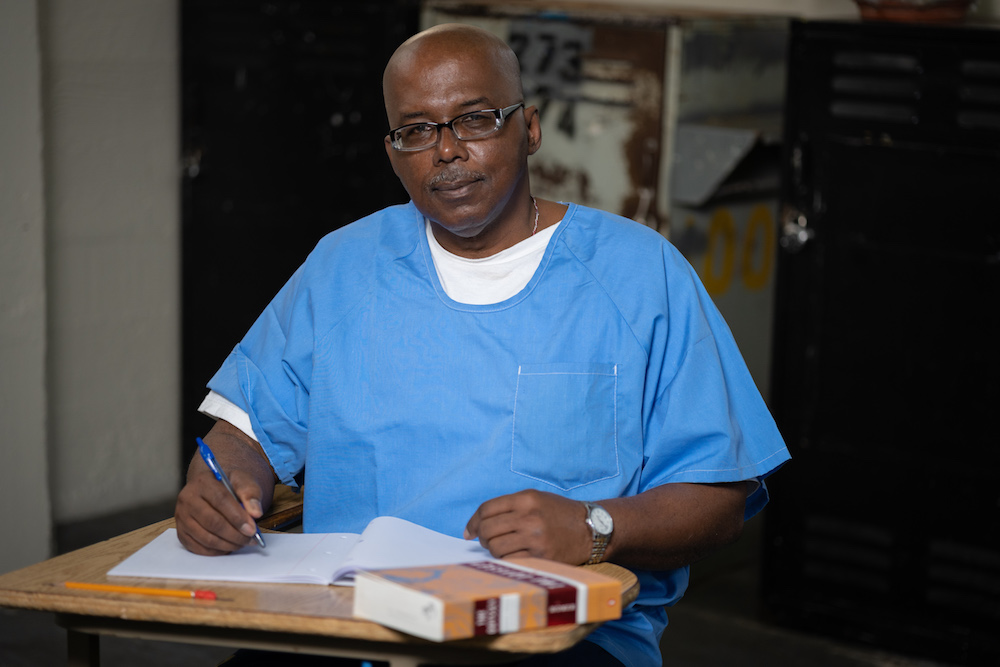
James Evans
The best instructor I had was Jennifer Fisher. She is an ethics and philosophy professor. I liked her classes because she told her students at the beginning that the class was going to be very hard and said, “If you want you can leave now.” I took both philosophy and ethics with Dr. Fisher and I was only able to earn C’s but it was a powerful experience of learning that I will carry through my life. She was influential to me because she aroused in me a creative effort not just in my work but the way I push myself in life.
—
The people who helped me succeed were all of the people associated with Patten University. The community brings out the best in a person. I have stepped into a new world where I want to learn so much with so little time to do it. But I have learned so much and from time to time, my confidence on subjects comes through and I feel great—I feel empowered.
—
My favorite school assignment was Biology. We studied living organisms and removed body tissue. There’s so much to learn in Biology that you can’t learn it all in a class setting, but I tried and received an A for it. I loved it.
—
The College Program changed my identity, and my relationship to life. It has left a tranquility in me.
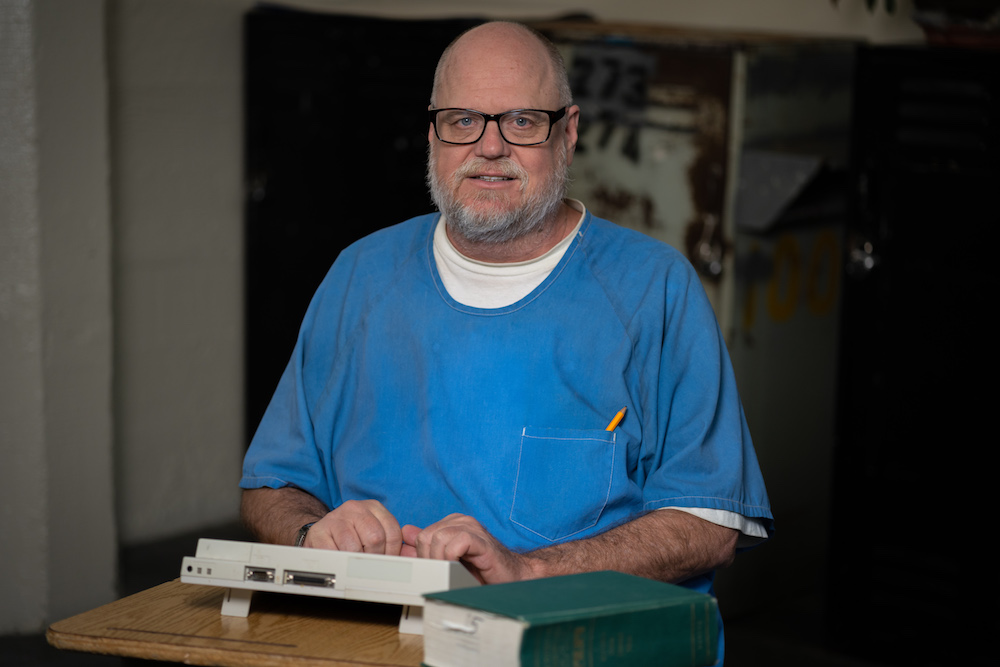
Louis Calvin
I would like to leave an environment which was improved by my participation in the College Program. I would like to encourage others who are affected by dyslexia and ADD to pursue educational achievement by my example. It will be interesting to see if the academic fundamentals I learned at the Prison University Project hold up in a regular college setting.
—
I surprised myself with creative writing assignments in ENG 101B and ENG 102. I was able to tie course assignments to my own experiences in California in what turned out to be a very pleasurable exercise.
—
The greatest obstacle I’ve had to overcome is my lifelong struggle with dyslexia and ADD. Our instructors gave me just enough flexibility and consideration to allow me to flourish in a rigorous academic environment in which there are no modern technical adaptations available for those of us challenged by learning disabilities.
—
One instructor, Dr. Paco Brito Nunez, was especially influential during critical points and not only in my liberal arts education, but in my struggle to adjust to long-term incarceration. His guidance and patience got me through tough times here in prison.
—
To my fellow graduates—we should all be encouraged to continue with positive programming. In the same way that we have had assistance from generous volunteers here in school, it is incumbent on us to show the way to those who come after us. Our education gives us the tools to make things easier for everyone around us. Let us set about our tasks in the same spirit of generosity which our volunteer advisors demonstrate here in the College Program.

Luis Lopez
Being accepted to the College Program in 2011 was one of the most important events of my life. At that time I had not been in a classroom for 15 years. From the very beginning, I noticed and liked the college’s commitment to excellence. The staff created a well-structured atmosphere that helped me feel confident and self-assured and challenged me to excel. My fellow students—eager to learn like me—helped me to fully engage in every single class.
—
English is my second language and this limitation, without a doubt, has been the most challenging part of being a college student. I pushed myself to the limits of my understanding and at some point (finally) I started thinking in English. It wasn’t until that point that I was able to form my own ideas and responses to what I was learning. This disadvantage required me to work hard and stay determined. It also makes me confident in knowing anybody can earn their degree—it just takes consistency and dedication.
—
The most influential teacher in my experience as a student was definitely Dr. Fisher. Her unique method of teaching, grading, and explaining ethical theories is simply exceptional. Dr Fisher’s proficiency in ethics helped to shape my current understanding of how societal norms and expectations are determined.
—
My beloved and wise mother Mercedes Molina is a formidable woman who believes that education is the most valuable thing a human being can pursue—that it allows one to live healthily, decently, comfortably, and to die honorably. She is so passionate about her belief that it feels magical. I believe every single word she says. I don’t like to think too much about what I’m going to do in my future life, but I can say this: whatever I decide to do, I’ll be able to ask logical questions, perceive solutions, weigh consequences, apply past insights to new contexts, and demonstrate self-evaluation in order to make wise decisions.
Please note that the Prison University Project became Mount Tamalpais College in September 2020.
